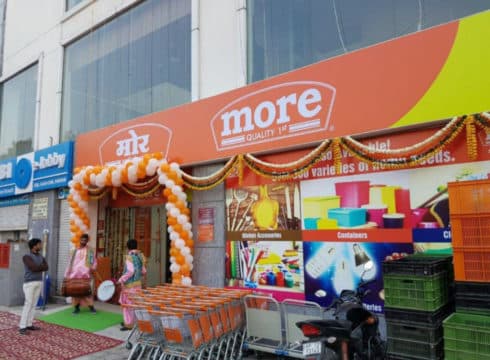In September 2018, Amazon and Samara Capital agreed to acquire More from Aditya Birla Group
CCI sent a notice to Samara Capital questioning Amazon's role in More if the joint takeover bid is approved
CCI raised questions on how the deal will comply with the updated FDI norms
Inc42 Daily Brief
Stay Ahead With Daily News & Analysis on India’s Tech & Startup Economy
The Competition Commission of India (CCI) has sought details from private equity (PE) fund Samara Capital on whether the proposed deal with ecommerce giant Amazon to jointly acquire More, a retail chain of supermarkets, is in line with the government’s revised foreign direct investment (FDI) ecommerce policy, according to two senior industry executives. The policy issued by the Department of Industrial Policy and Promotion (DIPP) on December 26.
In September 2018, Amazon and Samara Capital agreed to acquire More from the Aditya Birla Group for a reported deal value between $644.09 Mn (INR 4,500 Cr) – $715.66 Mn (INR 5,000 Cr). The acquisition took place through Witzig Advisory Services, a subsidiary of Samara in which Amazon is expected to take a 49% stake with the rest being retained by Samara. After the announcement, Witzig filed an application to the CCI for clearance.
The CCI, which sent the queries to Witzig in the last week of December, wants to know whether Amazon will be involved in the day-to-day operations of More, Amazon’s representation on the board and whether More will be integrated with the Amazon India marketplace. It has also asked how the deal structure is going to comply with the revised FDI norms.
The DIPP has effectively ruled out FDI in inventory-based ecommerce models. Also, India doesn’t allow overseas investment in ecommerce companies that sell directly to customers; it allows FDI only in marketplaces that connect sellers with buyers.
No ‘More’ On Amazon Marketplace?
What the latest development has done is raise concern about the viability of the More deal. The revised norms may make it difficult for Amazon to strengthen the relationship between its India marketplace and More and use the latter as a seller on its hyperlocal food and grocery platform Amazon Prime Now, the two executives reportedly said.
Basically, More will not be able to sell on the Amazon platform and, in that case, the US company will have to treat its investment in More as a purely financial one.
“In the current circumstances, the CCI’s queries in the backdrop of the revised policy is against Amazon’s original game plan to acquire the More chain,” one of the executives said.
According to the unnamed executive, Amazon had already decided to keep a distance from the board and management team of More and, hence, it also did not want a majority holding in Witzig. However, the acquisition is planned to strengthen Amazon Prime Now, where More is a seller.
“While there were no immediate plans to integrate backends, the acquisition would have integrated the front-ends and created omnichannel capabilities for both which will not be possible now,” the executive said.
Battle Grocery Royale
In an interview given to Mint in December, Flipkart CEO Kalyan Krishnamurthy said that the online retailer is at least “twice the size” of its nearest competitor, taking a clear jibe at Amazon.
What was also important to note is that Krishnamurthy disclosed that the Bengaluru-based company would invest heavily in expanding its newer categories such as furniture and groceries.
“Flipkart may invest in or partner with offline retailers in groceries and furniture to become a leader in these categories. Grocery is by far one of the most difficult businesses we have launched. In Bengaluru, we’ve seen a huge amount of customer adoption and a lot of learnings,” Krishnamurthy said.
Apart from the More deal, Amazon already has a deal for a 9.5% stake in Kishore Biyani’s Future Retail and is said to be on the prowl to further increase this stake. Future Retail owns and operates brands such as BigBazaar, EasyDay, and Niligiris.
Grocery retail in India is estimated to comprise over 60% of the country’s total retail market. Analysts peg it anywhere between $400 Bn to $600 Bn at present, with the potential to cross $700 Bn by 2022, according to a report by Wharton School of the University of Pennsylvania.
Online grocery may be still a small market but is growing rapidly given the increasing per capita income and a burgeoning Indian middle class. It is currently estimated to be around $500 Mn to a little over $1 Bn and expected to cross $3 Bn to $5 Bn or even much more over the next three to four years.
In 2018, India’s largest e-grocer, BigBasket, received $300 Mn in funding led by China’s e-commerce giant, Alibaba. Last week, Supermarket Grocery Supplies Pvt Ltd, which runs BigBasket, reported a 34% hike in its revenues for the fiscal year ending March 31, 2018, reaching INR 1,606 Cr ($ 230.95 Mn), as against INR 1,197 Cr ($172.14 Mn) in the previous year.
Ecommerce companies in India are facing days of uncertainty and mistrust, with small and medium sellers alleging exploitation at the hands of ecommerce players. Meanwhile, the draft ecommerce policy is still taking shape and regulators are adopting an increasingly protectionist approach as they head into an election year.
{{#name}}{{name}}{{/name}}{{^name}}-{{/name}}
{{#description}}{{description}}...{{/description}}{{^description}}-{{/description}}
Note: We at Inc42 take our ethics very seriously. More information about it can be found here.


